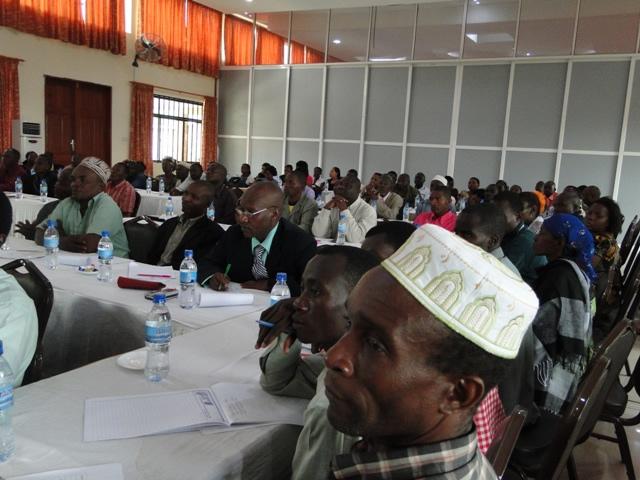Invest on indigenous small-holder farmers to feed the nation

7/12/2011
Tanzania has been urged to build capacity of the indigenous small-holder farmers so as to adequately feed the nation.
The plea was given by the Mwalimu Nyerere Foundation Executive Director Mr. Joseph Butiku when opening the one-day dialogue organized by Network of Small-Scale Farmers in Tanzania (MVIWATA). The dialogue organised 6th December, 2011, discussed changes that have been taking place during the past 50 years and the destiny of small-scale farmers.
He said, the government should change mind set of believing foreign investors will feed the nation, instead should invest to small-scale producers.He also, advised small scale farmers to take part in the process of writing the constitution once it starts so as to avoid land disputes. “There is a need to sensitise small scale farmers to understand their land rights, …now land has become a commodity and some dishonest people are geared to grab it.”
Butiku insisted that government leaders should revisit the Arusha Declaration because it spells out people’s rights on the land. He said farmers have to make sure that the new constitution stipulates their rights on the land clearly.
Meanwhile, Small scale farmers in Tanzania have asked the government to reposes land allocated to investors who have misused it to reduce conflicts.The request is among the resolutions which were passed at a one-day dialogue organized.
MVIWATA Executive Director Mr. Stephen Ruvuga said small scale farmers are not happy with the increasing land conflicts particularly in the rural areas.
Most of the conflicts, he said, are caused by government officials who do not want to adhere to the Village Land Act of 1999 and by investors who breach entered contract.
“We want the government to take stern measures against all investors who have failed to use the land as intended, including repossessing the land and give it to the landless to make them survive,” he said.
Some have even been accused of engaging in such activities as timber production and therefore destroying the environment.
In recent years, he said, Tanzania has witnessed increased number of land conflicts between farmers, herdsmen and investors which are now likely to tarnish the image of the country.
According to him, for the past fifty years, small scale farmers in Tanzania have been living in a poor state and some have been evicted from fertile land.
Ms. Sara Selemani, who is a farmer based in Kilosa District, Morogoro Region, said huge land for farming has been allocated to investors leaving farmers in the area without plots to work on.
As a result, she noted, the district has been experiencing intermittent fighting between farmers and herdsmen looking for land.
She said most investors rent land for farming at a cost of 50,000/- per acre contrary to the law. She added if the situation is left uncontrolled the small farmers would end up being cheap labourers in the emerging plantations.
For his part, senior lecturer at the University of Dar es Salaam Dr Bashiru Ali, told the farmers that land and its related issues should be thoroughly elaborated in the new Constitution to avert possible conflicts associated with handling and management.
“We need to look into our land laws and strengthen them so that they adequately protect the rights of indigenous Tanzanians,” he said.
He urged farmers to change and look for their rights using applicable methods which could help to end crisis.
Dr Bashiru said there is fear that Tanzania would enter into land conflicts if the current trend of land allocation to foreigners is not reviewed.
Experts who delivered their presentations at the dialogue which attracted over 200 farmers are Dr Azavaeli Lwaitama of the University of Dar es Salaam, Dr Damian Dabagambi of the Sokoine University of Agriculture, Col (rtd) Anatory Tarimo, former regional commissioner of Manyara Region and Mr Stephen Mashishanga former regional commissioner.






















